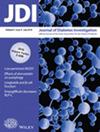Pathogenic variants prevalence patients with diabetic kidney disease in Japan: A descriptive study
Abstract
Aims/Introduction
The impact of rare pathogenic variants on diabetic kidney disease (DKD) has not been investigated in detail. Previous studies have detected pathogenic variants in 22% of Caucasian patients with DKD; however, this proportion may vary depending on ethnicity and updates to the database. Therefore, we performed a whole-genome analysis of patients with DKD in type 2 diabetes mellitus in Japan, utilizing a recent database to investigate the prevalence of kidney-related pathogenic variants and describe the characteristics of these patients.
Materials and methods
Whole-genome sequencing was performed, and variants were analyzed following the GATK Best Practices. We extracted data on 790 genes associated with Mendelian kidney and genitourinary diseases. Pathogenic variants were defined based on the American College of Medical Genetics criteria, including both heterozygous and homozygous variants classified as pathogenic or likely pathogenic.
Results
Among 79 participants, heterozygous pathogenic variants were identified in 27 (34.1%), a higher prevalence than previously reported. No homozygous pathogenic variants were detected. The identified heterozygous pathogenic variants were roughly divided into 23.7% related to glomerulopathy, 36.8% related to tubulointerstitial disease, 10.5% related to cystic disease/ciliopathy, and 28.9% related to others. Diagnostic variants were found in 10 patients (12.7%) in seven genes (ABCC6, ALPL, ASXL1, BMPR2, GCM2, PAX2, and WT1), all associated with autosomal dominant congenital disease.
Conclusions
This study identified a considerable number of patients with DKD in Japan who carried kidney-related heterozygous pathogenic variants. These findings suggest potential ethnic differences and highlight the impact of database updates on variant detection.


 求助内容:
求助内容: 应助结果提醒方式:
应助结果提醒方式:


